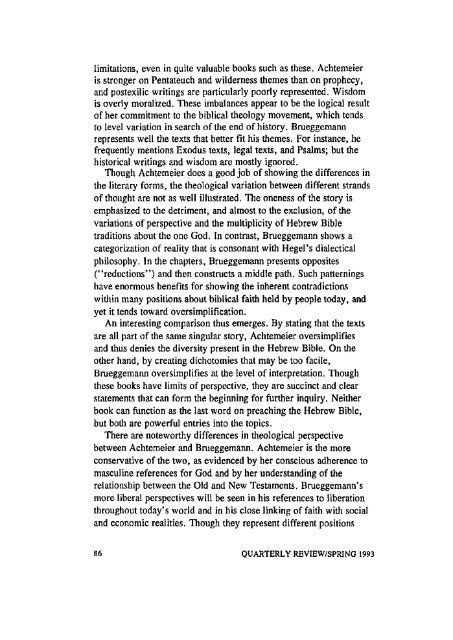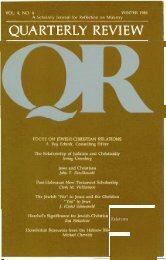TJieodore W. Jennings, Jr. The Meaning of ... - Quarterly Review
TJieodore W. Jennings, Jr. The Meaning of ... - Quarterly Review
TJieodore W. Jennings, Jr. The Meaning of ... - Quarterly Review
Create successful ePaper yourself
Turn your PDF publications into a flip-book with our unique Google optimized e-Paper software.
limitations, even in quite valuable books such as these. Achtemeier<br />
is stronger on Pentateuch and wilderness themes than on prophecy,<br />
and postexilic writings are particularly poorly represented. Wisdom<br />
is overly moralized. <strong>The</strong>se imbalances appear to be the logical result<br />
<strong>of</strong> her commitment to the biblical theology movement, which tends<br />
to level variation in search <strong>of</strong> the end <strong>of</strong> history. Brueggemann<br />
represents well the texts that better fit his themes. For instance, he<br />
frequentiy mentions Exodus texts, legal texts, and Psalms; but the<br />
historical writings and wisdom are mostly ignored.<br />
Though Achtemeier does a good job <strong>of</strong> showing the differences in<br />
the literary forms, the theological variation between different strands<br />
<strong>of</strong> thought are not as well illustrated. <strong>The</strong> oneness <strong>of</strong> the story is<br />
emphasized to the detriment, and almost to the exclusion, <strong>of</strong> the<br />
variations <strong>of</strong> perspective and the multiplicity <strong>of</strong> Hebrew Bible<br />
traditions about the one God. In contrast, Brueggemann shows a<br />
categorization <strong>of</strong> reality that is consonant with Hegel's dialectical<br />
philosophy. In the chapters, Brueggemann presents opposites<br />
("reductions") and then constructs a middle path. Such patternings<br />
have enormous benefits for showing the inherent contradictions<br />
within many positions about biblical faith held by people today, and<br />
yet it tends toward oversimplification.<br />
An interesting comparison thus emerges. By stating that the texts<br />
are all part <strong>of</strong> the same singular story, Achtemeier oversimplifies<br />
and thus denies the diversity present in the Hebrew Bible. On the<br />
other hand, by creating dichotomies that may be too facile,<br />
Brueggemann oversimplifies at the level <strong>of</strong> interpretation. Though<br />
these books have limits <strong>of</strong> perspective, they are succinct and clear<br />
statements that can form the beginning for further inquiry. Neither<br />
book can function as the last word on preaching the Hebrew Bible,<br />
but both are powerful entries into the topics.<br />
<strong>The</strong>re are noteworthy differences in theological perspective<br />
between Achtemeier and Brueggemann. Achtemeier is the more<br />
conservative <strong>of</strong> the two, as evidenced by her conscious adherence to<br />
masculine references for God and by her understanding <strong>of</strong> the<br />
relationship between the Old and New Testaments. Brueggemann's<br />
more liberal perspectives will be seen in his references to liberation<br />
throughout today's world and in his close linking <strong>of</strong> faith with social<br />
and economic realities. Though they represent different positions<br />
86 QUARTERLY REVIEW/SPRING 1993












